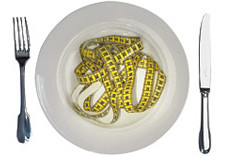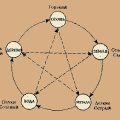 Strict weight loss diets Do not think about anythingThat is why, starting to lose weight, we enter a special internal state: we abstract from the sensations of hunger and satiety, force ourselves to forget about high-calorie foods - the most desirable for a hungry person, strictly monitor food intake, try to inspire ourselves and others that boiled cabbage without salt Is the best thing we have ever eaten in our life. We force ourselves to disconnect from everything that can knock us out of the state of self-control - from anxiety, sorrow, worries - and think about only one thing: how to lose weight? This focus on an idea that fills the entire inner world of a person in the mid-70s was described by American researchers Peter C. Herman and Janet Poliy, calling it "cognitive limitation." it is not easy to hold out in such an enhanced mode of self-control: it is enough to be seduced by just a piece of forbidden product - and the system loses its brakes. Then the feeling of guilt comes. To get rid of it, and at the same time to “punish” ourselves for a breakdown, we tighten the screws even tighter ... Ineffective Techniques Everyone strives to inspire us truly to work Sisyphus: by any means it is necessary to keep ourselves in a state of cognitive limitation. Any diet is a mechanism designed to protect us from any nutritional desires. Moreover, this mechanism is deliberately ineffective: seducing with unstable weight loss, we are encouraged to keep tight control always and everywhere ... until the whole system collapses and the kilograms return with interest!
Strict weight loss diets Do not think about anythingThat is why, starting to lose weight, we enter a special internal state: we abstract from the sensations of hunger and satiety, force ourselves to forget about high-calorie foods - the most desirable for a hungry person, strictly monitor food intake, try to inspire ourselves and others that boiled cabbage without salt Is the best thing we have ever eaten in our life. We force ourselves to disconnect from everything that can knock us out of the state of self-control - from anxiety, sorrow, worries - and think about only one thing: how to lose weight? This focus on an idea that fills the entire inner world of a person in the mid-70s was described by American researchers Peter C. Herman and Janet Poliy, calling it "cognitive limitation." it is not easy to hold out in such an enhanced mode of self-control: it is enough to be seduced by just a piece of forbidden product - and the system loses its brakes. Then the feeling of guilt comes. To get rid of it, and at the same time to “punish” ourselves for a breakdown, we tighten the screws even tighter ... Ineffective Techniques Everyone strives to inspire us truly to work Sisyphus: by any means it is necessary to keep ourselves in a state of cognitive limitation. Any diet is a mechanism designed to protect us from any nutritional desires. Moreover, this mechanism is deliberately ineffective: seducing with unstable weight loss, we are encouraged to keep tight control always and everywhere ... until the whole system collapses and the kilograms return with interest!
- This psychological method of losing weight is to identify yourself with a certain guru in the field of nutrition - a dietician or a man who has already managed to lose weight.
Turning food into a ritual
- Many methods of weight loss make you treatthe reception of food as a certain sacred activity. "In Madeleine Gest's system, I like the fact that it allows you to eat honey and dried fruits between basic meals. I chew these pieces with pleasure, experiencing an almost religious feeling. This helps me not to break, "says Alina, 22, who is optimistic about the third serious diet in her life.
Ignore "bad" products
- One of the most effective methods is to convince oneself,that "problem" products are simply inedible. "The potato does not exist for me anymore. Montignac said well: it's food for pigs, "says 40-year-old Alexander. For the famous Dr. Atkins, refined sugar was a terrible poison; he argued that humanity began to have health problems at the very moment when people began to consume carbohydrates.
Overlook limitations
- So, the products that people liked beforeof how he took a diet, now disgust him, and so he does not feel that he lacks them. Therefore, he can deny that he is subjecting himself to some kind of restrictions.
There is less and betterAnd if you look at yourfavorite food otherwise - not as an enemy, but as a friend and ally? Do not succumb to the endless struggle with tasty and healthy foods, do not cross out potatoes and chocolate from your life, imitating the love of "zero" yogurt and steam carrots, but lose weight while continuing to eat full, delicious food, but just in smaller quantities? Work on changing their eating habits will require some effort: henceforth we will not eat the full portions, and therefore have (albeit with regret) to sacrifice some of the delicious food. In addition, we will have another parting - with a part of ourselves, our weight, and this always gives a certain psychological effect: we remember about other losses, to a greater or lesser extent conscious. As we have already said, we often eat not because hungry, but because we want to forget about our problems - internal and in relations with other people. It is possible to lose weight, someone will not need the advice of a nutritionist, but the help of an experienced psychotherapist. All sorts of diets, systems and methods of nutrition give only a temporary effect. It takes serious work on yourself to become a harmonious person forever.









